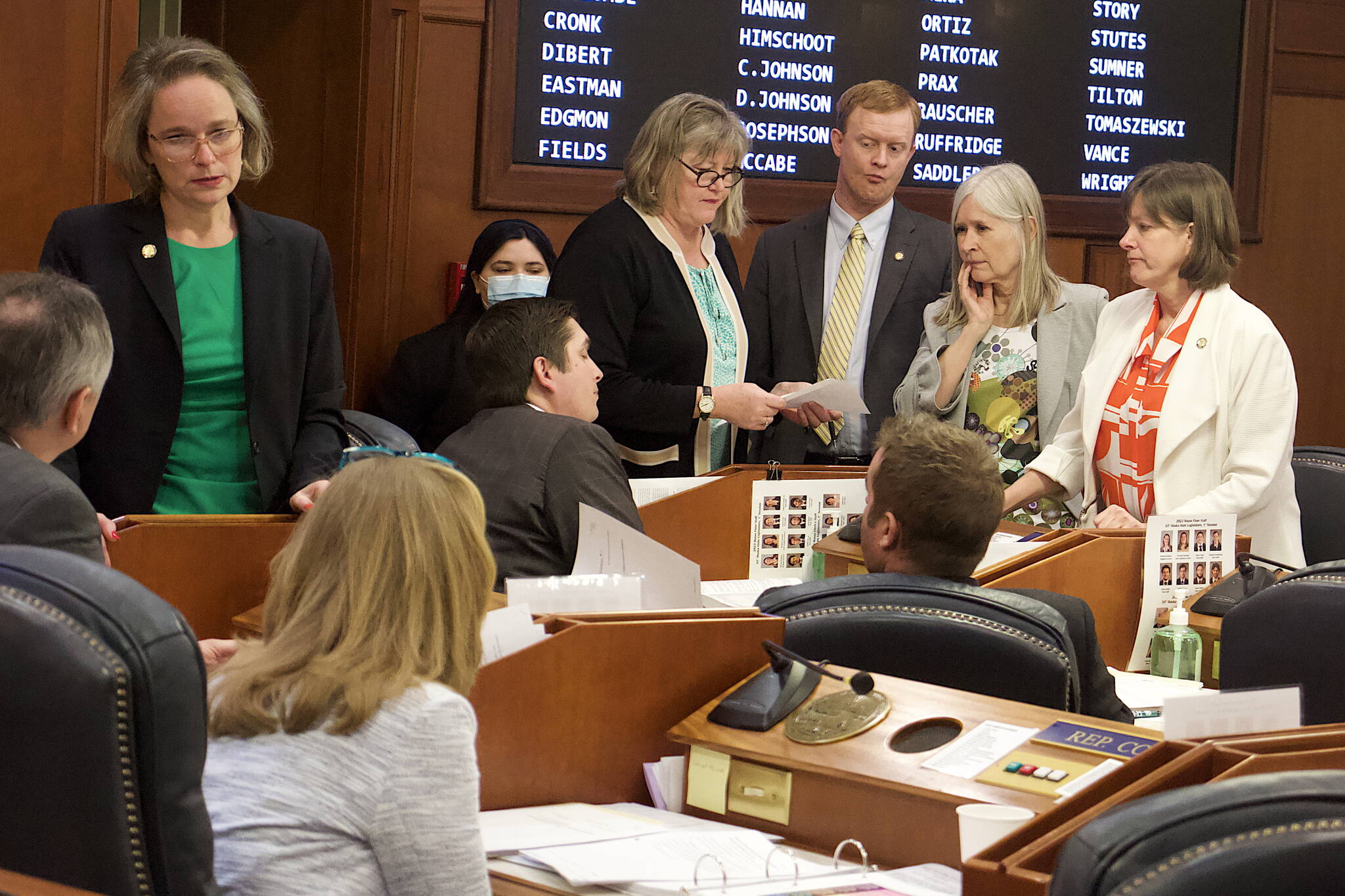The state House on Thursday passed a bill that would make second-degree murder charges a possibility for people who manufacture or distribute certain illegal drugs, including fentanyl, if their actions lead to an overdose death.
The bill passed by a 35-5 vote after more than five hours of debate over two days over what even a supporter called a “performative” measure that will have little real-world impact.
House Bill 66, introduced by Gov. Mike Dunleavy, also eliminates “good time” credit for inmates convicted of murder for such drug fatalities, and increases punishment for some first-time offenders and people providing drugs to people who are disabled or incapacitated.
Supporters of the bill cited dramatic figures such as 253 Alaskans dying from drug overdoses in 2021, a 158% increase in fentanyl deaths that year, and a 417% increase between 2017 and 2021. Opponents also provided striking statistics, such as noting six other states implementing similar laws saw overdose deaths rise between 7.6% to 21% in one year because people were afraid to call police or hospitals to report overdoses.
But for legislators speaking from different viewpoints, the bill’s real-world meaning came down to two people.
“I figure that two people nationwide died from overdoses while we were debating this bill yesterday,” said Rep. Craig Johnson, chairman of the House Rules Committee, referring to the initial floor discussion that lasted more than three hours. “Make no mistake about it: selling fentanyl and now methamphetamine is murder for hire. It is motivated by profit, it is motivated by self-benefit, and the children and families of Alaska are suffering for it.”
Two entirely different people — representing the total number of people in Alaska convicted during the past 15 years for the current offense of manslaughter for making or distributing such drugs resulting in fatalities — were singled out by Rep. Andrew Gray, an Anchorage Democrat.
“What this bill will do is allow those two people to be locked up a little bit longer,” he said.
But while Gray expressed stirred up some murmurs by calling it a “performative bill,” he said he supports it because the provisions he objected to most — such as eliminating “good time” credits for all felony drug convictions — were removed at the urging of correctional institution and other officials as the proposal moved through the House.
A similar contrary element existed throughout the House, as votes on the numerous amendments to the bill frequently strayed from majority and minority coalition lines. Juneau’s two Democratic representatives were on opposing sides of some of those amendments and on the bill itself, with Rep. Andi Story voting in favor and Rep. Sara Hannan in opposition.
Hannan, like others opposing the bill, said it doesn’t enact anything meaningful to address the core issues that cause drug addiction and offenders relapsing after treatment or prosecution.
“We are not dealing with prevention of a death, but only the punishment of the dealer,” she said.
A few legislators opposing the bill said it will actually lead to more deaths, based in the increased overdoses in other states due to people failing to report them.
“We have a duty to examine the facts and not just our feelings,” said Rep. Jeanine Armstrong, an Anchorage Democrat.
But a fellow Anchorage Democrat, Rep. Andy Josephson, responded to concerns about the limited enforcement impact of the bill by noting prosecutors have stated one of the reasons there’s few convictions for the most serious offenses is a “proof problem” to support tougher charges.
“This creates more leverage and allows us to find kingpins so we can get to those root causes,” he said.
Several supporters of the bill said they agree with dissenters who say improvements are needed to the state’s rehabilitation facilities and programs, but that’s a separate consideration.
Johnson said he hopes the bill’s provisions will deter out-of-state drug dealers from coming to Alaska and, noting some states allow the death penalty for drug-related deaths, said “if I thought I could get that through I might try that.”
Passage of the bill occurred on the same day a Washington man was arrested at Juneau International Airport on suspicion of carrying about $110,000 of fentanyl and methamphetamine.
Other supporters said avoiding addiction and rehabilitation is about personal responsibility.
“We get a savior complex in this building,” said Rep. Sarah Vance, a Homer Republican. “We just want to help everybody, and we think we can do it all and government is the solution.
“There are not enough state programs to fill the God-shaped hole in people’s hearts and why they seek drug addiction,” she said, subsequently adding “to the people who are struggling with addictions there is a way out, there is hope and I’m going to say it: I will tell you that you will find it with Jesus alone. That is the conversation many of us will face, because we are not the saviors in this room. But we are utilizing the tools that available to us by law to provide accountability to those who show no regard for the lives of your loved ones.”
• Contact reporter Mark Sabbatini at mark.sabbatini@juneauempire.com.

